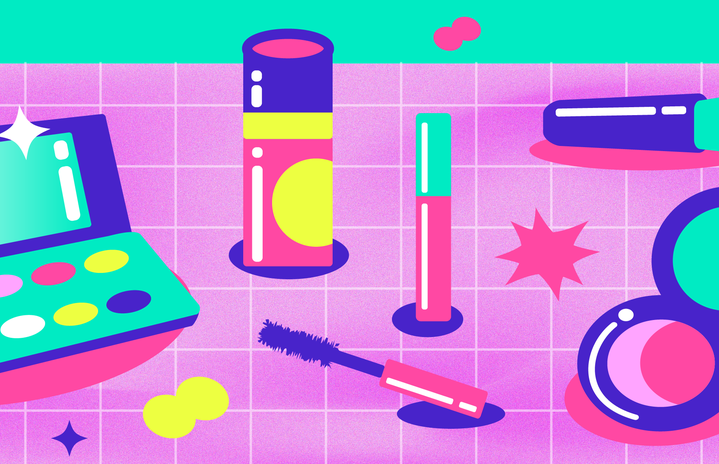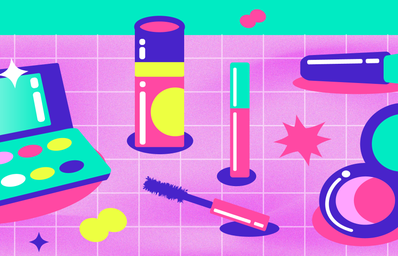I recently had the privilege of reading Florence Given’s “Women Don’t Owe You Pretty.” If you haven’t read the book, I would recommend it. In 201 art-filled pages, Given tackles many subjects: mental health, learning to grow and set boundaries, microaggressions, the stigma behind women enjoying sex, and the male gaze — to name a few. Given, who was only 21 at the book’s 2020 publication, challenges her readers to deprogram all the B.S. that society has fed them from birth.
Let’s Talk About the Beauty Industry
A discussion from the book that really stood out to me, and challenged me to think, is the intersection between capitalism, patriarchy, beauty, and privilege. Given inspired me to dissect every aspect of my life— including things I’ve never questioned before.
If I go to work, or class, or a social event without makeup, odds are that someone will say I look tired or drained. I know this because it’s happened. But if I wear makeup, I’ll receive a few compliments — or at least blend in and not be insulted.
If I go to a job interview dressed “feminine,” I’ll be interpreted as a “nice,” hirable woman. If I went to the beach without shaving, I’d probably get weird looks and be made fun of behind my back. So, it’s easier to shave and blend in because everyone does, and I always have, even though I don’t know why.
Society, the beauty industry, and men make a lot of money off women’s insecurities. I spend probably $300 a year on makeup, $1,500 on my hair, and even more on clothes and skincare. Most beauty advertisements claim to help women achieve the “best version” of themselves. But they’re just preying on existing insecurities, and creating new ones, to sell products. Even “self-care” is a capitalist hoax to get women to buy creams, face masks, eye patches, etc. Self-care doesn’t help you mentally — it equates happiness for women with beauty.
Society programs us to become willing consumers
When I was a little kid, I wasn’t insecure about anything. Then I started noticing magazine covers in check-out lines that compared the 10 “worst” and 10 “best” celebrity beach bodies. I saw cosmetic procedures advertised on highway billboards. Makeup commercials on TV promised to hide flaws I didn’t know I had. An adult at school once told me, “You’re skinny, but not as skinny as my daughter.” I was only 10 or 11, and suddenly my weight was a competition between me and other girls.
I’m not saying that we should start shaming other women — we do that enough already — for complying with beauty standards. And I’m definitely not saying women should boycott makeup. Instead, I think it’s worthwhile to reflect and think about why we engage in costly and time-consuming beauty rituals.
If you asked me a few years ago why I wore makeup to class, I would assuredly say, “because it’s how I express myself artistically! I feel just as confident without makeup.” And I really believed that. But now, I think about the fact that I’ve never posted a picture of myself online without makeup.
And this is super uncomfortable to think about, but wearing makeup and dressing a certain way makes life easier. I’m perceived better, people are nicer to me, I look more ”feminine” and “put together,” and I’m more likely to get a job or make connections. “Pretty privilege” is real, and life is easier and safer when women conform to beauty standards — especially for trans women.
Beauty and PRIVILEGE
It’s impossible to talk about beauty without talking about intersectionality. Different aspects of identity intersect to influence how society treats people, and the beauty industry is no different. I recognize that it’s easier for me to reject beauty standards than it is for other women. I don’t deal with homophobic, fatphobic, transphobic, or racist discrimination — and the beauty industry thrives on racism and fatphobia.
Think about advertisements that airbrush skin to look lighter and make features appear more Euro-centric. Think about how society tricks us into thinking people with average-sized bodies are “plus-sized.” Think about Black women being considered “unprofessional” for wearing their natural hair. Once, I attended a conference where a student shared that she often experienced the micro-aggression of being called “pretty for a black girl.” That has stuck with me since.
As Given writes in Chapter Two of her book, “The ability to defiantly resist is only afforded to those who are already privileged enough not to be ostracized if they do so.”
Conclusion
I can’t end this essay with answers — only points to think about. Women are taught from a young age that being thin, wearing makeup, following trends, and modifying their appearance are the tools to happiness. How are we supposed to know how we truly like to express ourselves when we’ve been conditioned into behaving a singular way? Isn’t that kind of scary to think about?
It’s important that women question what makes them truly feel good— not what makes them feel externally validated. We need to stop subscribing to the belief that the “desirable woman” exists in one singular font.
Maybe if we stopped shaming other women for going against the norm, more women would feel free to experiment. Maybe if women with privilege used that privilege to help other women and amplify voices, real change could be made. Maybe if adults stopped praising young girls for being “thin” or “pretty,” girls would have a better chance at figuring out what they actually value in life.


